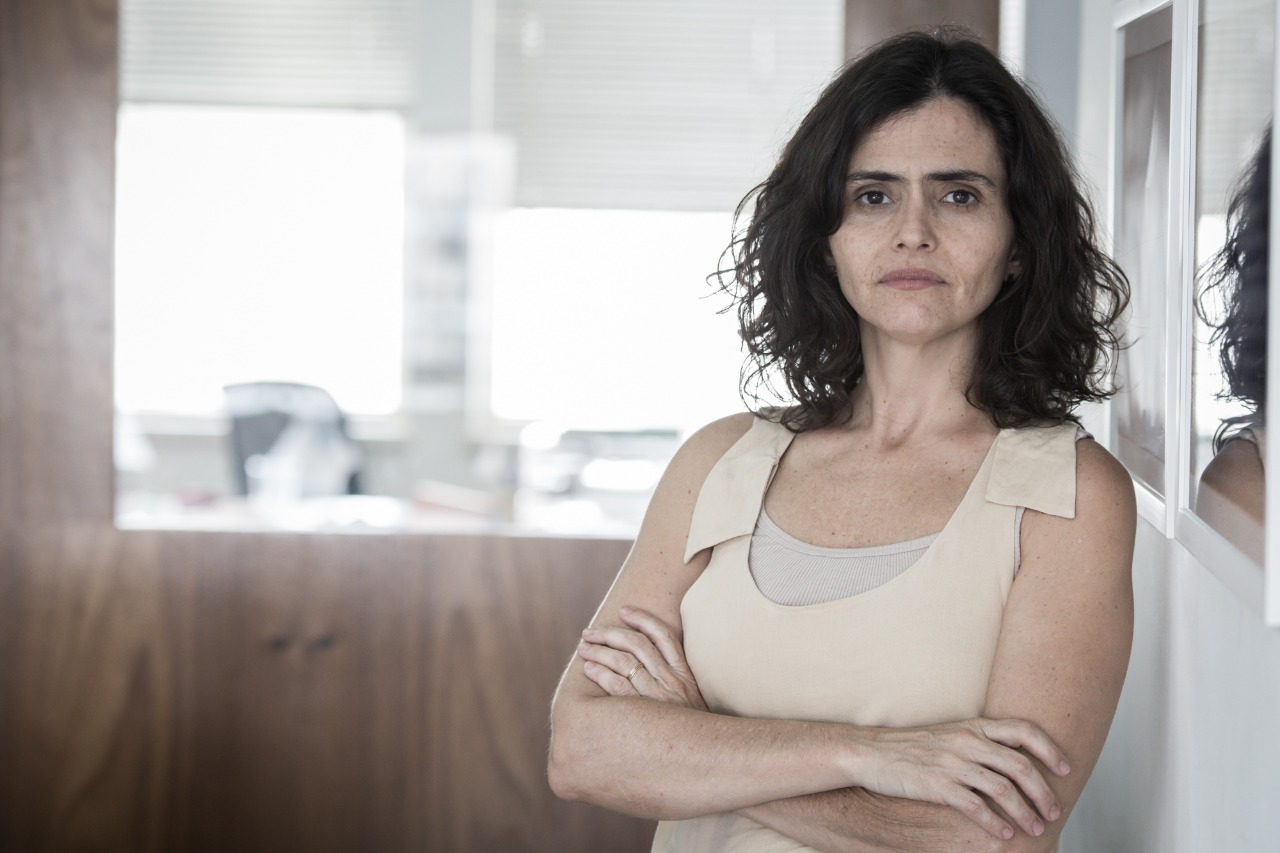
A lot has happened since Marina and I last met at the Legal Empowerment Leadership Course in Budapest at the end of 2019. Certainly, none of us expected the COVID-19 pandemic and how both our current and future projects would be affected by it.
Marina Dias is the Executive Director of the Instituto de Defesa do Direito a Defesa (Institute for the Defense of the Right to Defence, IDDD), in Brazil. She is a lawyer by training and deeply committed to social justice. After working many years for some of the most important private law firms in the country she changed her trajectory and now works to bring systemic change in Brazil, more so in its criminal justice system.
She is also one of the eight 2019 Legal Empowerment Leadership Course Awardees.
This women’s month, in honor of all the women who are at the forefront of legal empowerment in their communities, it is an honor to spotlight the work that Marina and the rest of the IDDD team do. In this interview, she takes me through how IDDD has adapted to the COVID-19 pandemic, her experience at the 2019 Legal Empowerment Leadership Course, and shares useful insight that she has learned in her legal empowerment journey.
Note: Some answers have been edited for length and clarity.
***
Can you briefly tell us about your work at IDDD?
IDDD was funded by criminal lawyers who understood the importance of having an organization whose mission focused on guaranteeing the right to defense: The exercise of right to defense for all people, independently of the crime they have been accused of, whether they are guilty or innocent, regardless of their race, gender, or socio-economic class.
IDDD’s mission is to democratize access to justice. We exist in order to guarantee that everyone has the right to a high-quality defense, a fair trial, individual guarantees, the presumption of innocence, and that they serve their sentence in a dignified manner.
Based on this mission, what kind of issues does your legal empowerment work address and what strategies do you employ?
IDDD takes the knowledge built across its different fields of action to its legal empowerment efforts. We work with incarcerated women to ensure their rights are upheld, and address issues related to evidence building in the criminal justice system, police testimony, recognition, and police stops and searches. In São Paulo, we have 15-million police stops per year, but only one percent of these cases result in arrests.
We have around 300 lawyers associated with IDDD. In addition to making financial contributions to the organization, these lawyers dedicate part of their time to volunteer for the organization, working on IDDD’s projects. Our general streams of work include advocacy at the judicial, executive, and legislative levels, where we work to prevent regression against individual rights, and we make sure that beneficial laws are passed. We are also involved in strategic litigation in the Supreme Court in emblematic cases, and also in prison task forces. Currently, we have assembled a COVID-19 Task Force to release high-risk individuals, prisoners who have committed petty, non-violent crimes, as well as mothers with children of up to 12 years old.
On discovering that one of the biggest challenges for incarcerated people is the lack of knowledge on how the incarceration process works, we designed a project that addresses that. Here, we address questions such as how one can do an habeas corpus themselves, how one calculates the length of their sentence and how regime progression works. This project has been in operation for the last ten years, with two editions per year, and around 30 incarcerated people participating in each edition.
We are also big believers that punitive culture must be transformed. To this end, we produced a documentary about the criminal justice system, which is called Sem Pena (Sentence on Trial). The film was shown in theaters and won a prize for best film elected by the popular jury.
Very interesting! Do you mind elaborating more on the aforementioned legal empowerment project inside prisons?
We run a training program to democratize and guarantee access to justice for incarcerated people, specially because the presence of the public defender’s office is still incipient and there are not enough public defenders to assist all the incarcerated people. Many times, people are incarcerated and a long time goes by without them having any legal representation. We believe that self-defense is key to enabling access to justice.
Each edition of this training program is preceded by a workshop for the lawyers associated with IDDD that will facilitate the project. The whole process is accompanied by an educator with popular education training, whose work is to break down the issues into accessible language and establish trust with the incarcerated persons participating in the course. This way there is a person that the participants can engage with in a deeper way, considering that the lawyers are always changing.
We also encourage the prisoners we work with to suggest topics of interest. One of the goals of the project is that they become multiplying agents of such knowledge. It is important to note that we not only cover legal related issues but also cover topics that make reflect on issues closely related to their lives. In the last edition, we invited two actresses to address gender and race. They guided very special corporal work with women.
For the first time in ten years, we weren’t able to run this project in 2020, as we didn’t have access to prisons due to the pandemic.
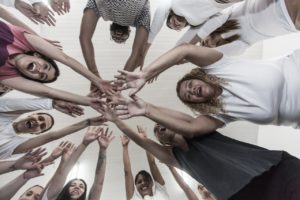
Participants, volunteers and facilitators during a session of the legal empowerment project within prisons. Photo courtesy of IDDD.
What impacts have you seen in the ten years you’ve run this project?
After the training, we’ve seen instances where incarcerated persons start making habeas corpus for their colleagues, and sharing what they’ve learned; which goes to show the importance of the training, especially with regard to participants feeling recognized as rights bearers. The training also prompts big changes among our volunteer lawyers. Even though a large number of volunteer lawyers at IDDD work in big law firms in the criminal field, most times, they haven’t interacted closely with the prison system here in Brazil. Through the program, they get to learn the reality of incarcerated people; of the racism that goes through this structure and the human rights violations that the prisoners go through, which then often leads to a paradigm shift.
For example, a lawyer that participated in one of these trainings and works in a big business law firm wrote to us explaining the impact the project had in her life. She appreciated how much the project had helped her bring to perspective that building together with incarcerated people is fundamental to help them transform their reality. This makes a big difference for IDDD’s purpose. You can’t just give the answer to the solution. We need to build together: It’s not only about transforming the lives of incarcerated people, we are also transformed along the way.
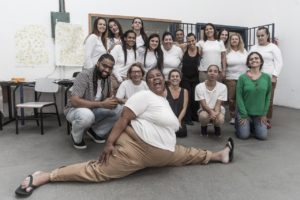
Participants, volunteers and facilitators during a session of the legal empowerment project within prisons. Photo courtesy of IDDD.
Covid-19 has impacted our lives and our work in unexpected ways. How has this affected IDDD’s work and how are you adapting to continue supporting the groups that you work with?
Since March 13, 2020, we have been in lockdown. On May 16th, we went to the Federal Supreme Court with a petition to have incarcerated people belonging to high-risk groups, people that committed petty, non-violent crimes, and women released, because at the moment there already is an action at the Supreme Court discussing the unconstitutional state of affairs of the prison system. Though it has been recognized, it is yet to be finalized. At first, the minister rapporteur of the action gave a favorable decision, but it was overturned by other ministers. This was in the first week of isolation in Brazil. After that, we decided to act on individual cases. We are running a prison task force to respond to Covid-19 inside prisons and defend the rights of incarcerated people, where we have already acted on more than 500 cases, but it’s very difficult. The courts are not assuming their responsibility, resulting in plenty of deaths within the prison system. It doesn’t help that these cases are being underreported but we know that the number of deaths have already hit 5000.
We have also made access to information requests to all the states in the country. Information about the supply of masks and hygienic items, allowing prisoners to enjoy hours of natural light, etc. We are using this information to exert pressure. For example, we entered with a judicial action against the State of São Paulo to demand the provision of masks, access to water, hours of natural light, and COVID testing, among other things. São Paulo holds 30% of the prison population of the whole country.
We have also looked at the issue of access to justice and holding hearings by videoconference. This can be very dangerous. Mainly, in regards to custodial hearings, which is the presentation of the prisoner within 24 hours. If this is done via videoconference it is not possible to see signs of police violence. IDDD is fighting to impede that those court hearings are done via videoconference.
Would you care to elaborate what challenges (besides the pandemic) you encounter in your work, and how are you trying to overcome them?
One of the main challenges that we face at IDDD is the fact that we live in a society permeated by punitive culture, and a culture of fear. We are trying to raise awareness about criminal justice, and how the way that it has been addressed in the past has only brought more violence, and perpetuated the cycle of violence. How do we bring urgency to the issue taking into account the story of these people? How do we problematize punitive culture?
It is also challenging to maintain the engagement of volunteers. I realized the importance of making lawyers a part of the conversation, bringing them to co-create in the projects and to reflect together.
Bringing the world of lawyers closer to the world of people that suffer violence, to the human rights violations that we are working to change, is another challenge. These are very different realities. Lawyers are used to offering a solution; and that’s not working. People who live in the realities of human rights violations have a right to be the protagonists of their stories, especially if we want to generate systemic change. To change the mentality of lawyers is a big challenge, especially since it is a vision that is entrenched in the knowledge that comes from specialists. To address this, we are working to provide lawyers with a training on Paulo Freire’s education, so that they start to deconstruct this certainty that they have the answer to everything. For me, this has been one of the greatest challenges. But I speak about this with joy, because it’s a transformation that is not only about legal empowerment, but also about society. We have to build it together, with a collective vision, for it is much more powerful when it comes loaded with many meanings and perspectives.
People need to own their stories. Big organizations cannot think that they have the answer to all the problems that they are facing. That’s old. Conflicts need to be transformed by those that are part of such conflicts. Lawyers are an important piece, but by themselves they are not going to change that reality. Changing such a paradigm is a big challenge.
What can you tell us about sustaining and scaling such efforts? What strategies do you use?
As I mentioned, a key thing is to keep lawyers engaged. IDDD has been thinking about how to scale lawyers associated with the organization beyond São Paulo and Rio de Janeiro; how to expand it to the rest of Brazil. So we have already made changes to the way associates come on board. It would be amazing to increase our working capacity. We need to invest in training so that such knowledge is multiplied. For example, it is important to produce booklets so that the content is replicated. In the task force that IDDD is implementing, we have organized meetings with volunteers to discuss challenges, decisions, and doubts. The importance of building with them, of listening before making decisions. More and more we try to have collective building. What I want for associated lawyers with regards to legal empowerment, we also need to do it within the organization.
Another aspect of thinking in terms of scale is that when carrying out prison inspections (task forces), IDDD has the objective of verifying how the judiciary is applying a certain law, and we also produce information from data collection to influence public policies. For example, we implemented a task force with regards to women. For 6 months we went to the prison in the interior of São Paulo and conducted interviews with the women, besides working on their cases. One of the questions that we asked was: if you could send a message to the judge that will rule your case, what message would you send? We sent those answers by post to all the judges in São Paulo with a beautiful design by a visual artist. We try to bring in several dimensions. This project also resulted in the documentary Mães Livres (Free Motherhood).
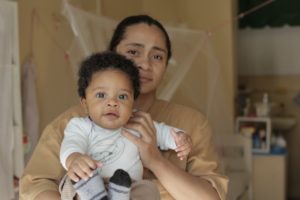
Participant in the project and documentary Mães Livres (Free Motherhood), with her daughter. Photo courtesy of IDDD.
It can be hard to imagine a time before COVID-19. Just a few short months before the pandemic, you were at the 2019 Legal Empowerment Leadership Course (LELC). Can you tell me about your experience?
The leadership course was very important. I have a conflict mediation and restorative justice training. I had the knowledge, but I was not clear on how to bring this into IDDD’s work. Knowledge that values the protagonism of the people involved in the conflicts and believes in transformation based on dialogue, listening, and collective construction, a process rooted in community values. After the course, I managed to bring to IDDD principles that are so valuable to me, but in a more concrete way.
I also realized that I value legal empowerment more, understanding it as a core strategy of IDDD. It can’t just be the projects inside prisons. It has to be reflected in other actions. Our project in the prisons still needs a lot of strengthening and transformation, including making the connection between prisons and the territories and communities. After the course, I feel more secure to give centrality to legal empowerment in the same way you at the Legal Empowerment Network and Namati present it.
I was a lawyer for many years. I was proud to say to my clients: “Don’t worry, I will take care of your problem. Go sleep peacefully”. To me, that was a sign of being an excellent lawyer. Today, I look at that with many reservations. I see prepotence in that attitude. The course gave me clarity about the importance of this change of mindset for the purpose of IDDD, so that it is possible to transform the reality of the criminal justice system. This does not mean giving up being absolutely technical, but just having the perception that the people who suffer daily violations have a lot to say.
Since then, I have presented multiple legal empowerment projects to donors. So far, we have successfully achieved funding for two of them: we managed to secure funding for our legal empowerment project inside the prison, which previously was funded through our institutional resources; and we secured funding to start a new legal empowerment project working with urban human rights defenders in issues such as police violence and criminal justice. I believe that these are a direct result from the course, and will help us make a qualitative leap. It turned a key, and IDDD’s board is also turning this key. My dream is to share the course’s teachings with the lawyers, because I believe that it will result in a big transformation.
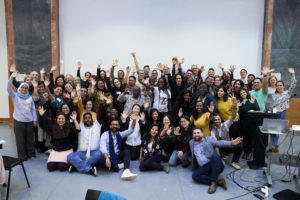
Marina together with other participants and faculty at the 2019 Legal Empowerment Leadership Course.
COVID-19 has really exacerbated many of the challenges we were facing. How does your organization and/or team show courage in the face of challenges?
To work in this field, you have to have courage. How can you not? Courage means to act with the heart. That is our work. We are moved by indignation. Our work can make a difference. IDDD takes this view from the field, from human rights, from activism, as a technical and legal perspective. This gives us courage to know that those two perspectives can make a difference.
A very clear example was when we experienced lockdown during COVID-19. I am a person who tries to be very attentive to the wellbeing of the team. I try to listen . I remember saying: “These are not normal times. Don’t worry if you don’t have resources, take your time”. However, the effects of the pandemic were so serious in the prison system that all the teams mobilized. It was very powerful and beautiful. I think that’s where this courage comes from.
I also insist on the importance of self-care within the team. Self-care as a tool for activism. Self-care and emotional balance are extremely important tools for people to keep going. If we don’t take care of ourselves, how are we going to take care of others? I don’t know if I do that with myself. I fail a lot, but at least it’s in my head. Those of us who work in the field of human rights always think that we have to sacrifice ourselves, and sometimes, this takes us to dangerous places. Is that empowering? Isn’t that also a colonizing attitude? Why do I need to lose myself to do what I do? I think it is important to pay attention to that with the people that work with me, to stand firm, with courage, acting with the heart. By keeping this watchful eye, we are more present, able to ask the right questions and not lose sight of intuition. The answers to such serious and complex problems are not just mental; they are emotional and sensorial. That’s why I believe so much in art as a way to achieve systemic change.
Do you have any tips from your experience that you would like to share with fellow practitioners?
To me, it makes a lot of sense to think about high impact projects, where we make systemic/sustainable transformation. We have to look far and at the same time, allow ourselves to ask questions. We can’t be afraid to change direction. There is a song by a composer called Tom Zé. He says that we need to deconstruct in order to construct. Sometimes the process is more important than the final goal. If we get too pressured by the final goal, we lose the possibility of drawing opportunities and insights.
As a person, I can connect with those in the territories and the decision makers. I think that active listening is the skill that I have cultivated the most. Listening, listening, listening. Paying attention. At times, those of us that work in the human rights field can sometimes be as authoritarian as those people we want to confront so badly. An authoritarian position cannot lead to transformation. Even when you are talking to a person who thinks very differently from you, it is interesting to actively listen. There is always an opportunity to catch something that can provide some kind of connection with the person that is able to completely change the course of the story.
Thank you for these powerful tips Marina. As we conclude this interview, do you have a book, song, resource, quote that keeps you and your team inspired that you’d like to share?
I remembered the song by the wonderful composer Gilberto Gil called Andar com Fé (Walk with Faith).
And there is Carlos Drummond de Andrade’s poetry that talks about the importance of living the present time, of being here, of holding hands.
Mãos dadas
Não serei o poeta de um mundo caduco.
Também não cantarei o mundo futuro.
Estou preso à vida e olho meus companheiros.
Estão taciturnos mas nutrem grandes esperanças.
Entre eles, considero a enorme realidade.
O presente é tão grande, não nos afastemos.
Não nos afastemos muito, vamos de mãos dadas.
Não serei o cantor de uma mulher, de uma história,
não direi os suspiros ao anoitecer, a paisagem vista da janela,
não distribuirei entorpecentes ou cartas de suicida,
não fugirei para as ilhas nem serei raptado por serafins.
O tempo é a minha matéria, o tempo presente, os homens presentes,
a vida presente.
Carlos Drummond de Andrade